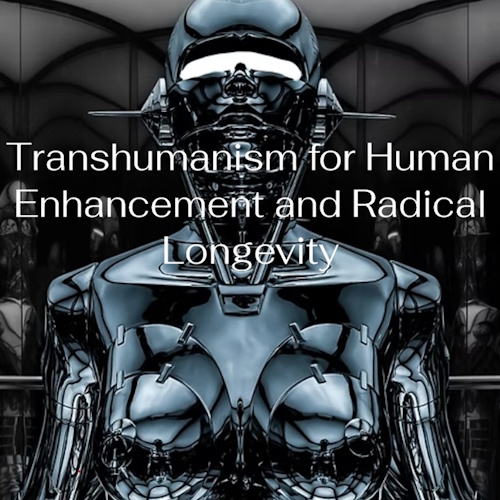Vital Foresight
The Case For Active Transhumanism by David Wood
Accelerating technological change threatens to shatter the human condition in multiple ways. We – all of us – face profound questions over the management of artificial intelligence, nanoscale computers, bio-engineering, cognitive enhancements, ubiquitous robots, drone swarms, nuclear power, planet-scale geo-engineering, and much more.
What these technologies enable is, potentially, a world of extraordinary creativity, unprecedented freedom, and abundant wellbeing. That’s provided we can see clearly enough, in advance, the major disruptive opportunities we will need to seize and steer, so we can reach that destination. And provided we can step nimbly through a swath of treacherous landmines along the way.
That’s no small undertaking. It will take all our wisdom and strength. It’s going to require the very highest calibre of foresight.
Vital Foresight Book Review
As I find with all of David Wood's books, the depth of knowledge displayed is deep and intellectual, but it is written in a style that is easy to read and logical to follow for non-specialists. The end result being a concise yet powerful guide to navigating the future with clarity and purpose.
Wood explores key areas such as exponential technologies, ethical foresight, strategic thinking, and global risks, all while encouraging readers to adopt a proactive, solutions-focused mindset. It's an inspiring and practical read for anyone interested in shaping a better future. If the future goes bad, it's a fair bet that it will be because early warning signals to one or more of his landmines were ignored.
The real-life examples demonstrate that this isn't an academic exercise, but a pragmatic guide to improve our chances human survival. It also provides plenty of interesting insights into history of technology, including the phone industry, 2008 financial crash, cancer, Apollo moonshot and fusion power. I particularly enjoyed the concise and clear explanation of Geoffrey Moore’s Crossing the Chasm theory.
Want to look up? Then Vital Foresight will help you understand what to look for.
Highlights
Here are 101 key points from Vital Foresight:
- Transhumanism is the philosophy that we can and should develop to higher levels, physically, mentally, and socially, using rational methods.
- Foresight isn’t something you do just once and then rest on your laurels.
- The final human generation may already be alive, coexisting with the foundations of the first truly transhuman generation.
- Excited predictions of positive technological progress have not been wrong; they’ve been incomplete– dangerously incomplete.
- It’s my view that humanity is collectively sleepwalking toward disaster.
- Religious forecasts of apocalypse are being overtaken by fearful predictions from secular sources.
- Positive political reform can do a great deal to reduce threats of starvation and famine.
- Whilst the key forecasts in the book [The Population Bomb] turned out to be wrong, they were not necessarily wrong.
- Good foresight also includes anticipating limits to what innovation can accomplish under current conditions.
- Rather than being presented with undue exactness or any false sense of certainty, predictions need to emphasise their probabilistic nature.
- The big picture, with its overall threats and possibilities, is more important than individual detailed scenarios.
- “Maginot Line” neglects to prepare for a future that may involve threats or opportunities of a different character from in the past.
- Our own ideas about the future, held too tightly, can prevent us from seeing what is actually happening.
- Misperceptions often involve self-deception as well as deliberate deception by others.
- Most infectious diseases fall far short of killing millions. But that’s no reason to dismantle centres for the control of diseases.
- There is plenty that can be done to reduce the threats from existential disaster.
- The percentage of the overall population who are likely to want to initiate horrific acts of mass destruction remains tiny. But what’s changing is the ease with which people in that tiny fraction of humanity can act on their urges.
- Common infrastructure delivers profound benefits, at the same time as it poses risks.
- Financial systems regularly increase in complexity, as a result of innovations in accounting, banking, investing, insurance, currencies, and so on.
- The tendencies for markets to slip into failure modes has been long known to economists.
- Without democratic vigilance and occasional incisive action, the complex might grow so powerful that it can no longer be controlled.
- People who adopt ideas that the rest of us would assess as utterly irrational aren’t necessarily being stupid.
- People’s readiness to believe outlandish conspiracy theories stems from the amount of corruption they have experienced in their lives.
- Groups driven by an enraged sense of being left behind can use new technologies to damage or punish a world for which they feel little personal affection.
- Exponential growth did take place in prehistoric times, but our ancestors rarely observed it directly.
- Alongside our inabilities to think seriously about exponentials and probabilities, we have inherited some dangerous mental assumptions regarding the reliability of our own thinking processes.
- We may become especially vulnerable to overconfidence if we have experienced success in past tasks.
- Economic motivation, such as the need to earn a salary, can badly interfere with your reasoning abilities.
- Catastrophic risk exists whenever strong links can be formed between factors that previously seemed to be independent.
- A great deal of the progress made throughout human history has involved improvements in efficiency.
- Initiatives to improve efficiency need to sit alongside initiatives to improve resilience.
- Whatever plans we may have for the future, we first need to survive in the present.
- The more complex our network of relationships and social obligations, the greater the importance of forming and following longer-term plans.
- Governments throughout the world should appoint senior ministers with explicit responsibility for future generations.
- According to Hobbes, in the absence of mechanisms to ensure good cooperation, the natural state of human affairs would be a state of war “of every man against every man”.
- Once it has obtained its own power, the government can end up harming individuals even more than they were previously likely to harm each other.
- There are many downsides to preferring loyalty to truthfulness.
- Many of the causes of shortsight I’ve described in this chapter have the same solution: education.
- Going beyond respect for disruption to worshipping it, is a move fraught with hazard.
- A successful disruption generally involves a combination of a number of different breakthroughs, that are applied at the same time.
- Disruptions typically pass through a phase in which little change is evident to any casual observer, before apparently shifting gear into a much more dramatic phase.
- Financial systems can continue for a long time in a state of intrinsic instability.
- As well as a potential exponential growth on the supply side of innovation, there can be potential exponential growth on the demand side.
- Any large project of this sort needs two sorts of activity: “doing” and “reviewing”.
- Good foresight accepts the possibility of refutation, whereas bad foresight carries on regardless.
- The best solutions are likely to incorporate insights from people that come from different backgrounds.
- To create prosperity, we have to prepare scenarios involving adversity.
- The mere fact of someone making a forecast that turns out to be true, cannot be taken as a sign that any new forecasts from that person will be reliable.
- Superforecasters prioritise looking for evidence that would disprove their current favoured hypothesis.
- Accelerating technological change will deliver sustainable superabundance.
- Better technology enables better tools, and vice versa.
- Acceleration can undergo some backward steps ahead of picking up pace again in new circumstances.
- In 1870, people in the UK received on average 0.8 years of formal tuition.
- Technology can find many new uses, beyond those considered by its original inventors.
- The first phase of a technological revolution sees a worsening of inequality, whereas the second phase sees a reduction again.
- The full significance of various breakthroughs usually only becomes clear in retrospect.
- A cost of $ 95.3 million to sequence an entire human genome in September 2001 reduced to $ 7.1 million by October 2006, $ 70.3 thousand by October 2009, and comfortably less than one thousand dollars: $ 606 by May 2019.
- Prowess in reading DNA has been followed by prowess in writing DNA.
- It’s possible, indeed, that by around 2040, low-cost suites of therapies will have become widely available that enable people to remain in a biologically youthful state for as long as they wish.
- The infotech of the fourth industrial revolution involves drawing conclusions from information.
- The general pace of improvements in AI will be faster than the pace of technological change in earlier industrial revolutions.
- A key goal of cognotech is to radically improve mental health.
- Just being clever is no assurance of avoiding stupidity or self-destruction.
- “transhumanism”, because it looks beyond the current circumstances of humanity to a situation which transcends many of the limitations of human experience.
- This possibility of superabundance transforms many previously vexed moral questions about trade-offs.
- Our nature was largely crafted by blind forces that operated throughout countless millennia; now it can be changed via conscious, intelligent design, within just a few decades.
- The public assessment of transhumanism has been darkened by too much prominence being given, not to the essential features of the movement, but to what I’ve described as eight aspects of a transhumanist shadow.
- Transhumanism looks forward to enabling everyone to enhance themselves– and any children they choose to have.
- I therefore see it as unwarranted to suggest that transhumanism has inherent totalitarian tendencies.
- Transhumanists readily acknowledge that scientific knowledge is provisional and incomplete.
- Transhumanism supports protopian improvement and extropian transformation, but avoids the alleged utopian vice of targeting any fixed, unchanging future vision.
- Unmodified humans will increasingly be unable to compete in various areas of life.
- In a sense, the mental states of anxiety and insecurity might still have utilitarian value.
- Transhumanists are clear that the purpose of human life is something for humans to explore and define.
- Active transhumanism advocates the cherishing and nurturing of diverse opinions and lifestyles.
- For better or worse, in our present status, we humans are strongly influenced by the narratives that we tell ourselves.
- Improving the people involved in all aspects of politics would be an important step forward.
- Whilst there are, indeed, reasons to worry about the misuse of power by politicians, there are also reasons to worry about the misuse of power by lots of other groups of people.
- The fact that some governments have failed, does not imply that all governments should be resisted, or minimised.
- Superdemocracy: “Government of the people, resources, institutions, and technology, by the people, institutions, and technology, for the people, and for consciousness in general.”
- The most profound transformations usually involve not just one trend in isolation but the interactions between multiple trends.
- Individuals don’t operate in isolation.
- People’s willingness to give serious attention to new ideas depends on the degree to which they are dissatisfied with current prevailing systems of thought.
- Never before has so much energy been unleashed onto the task of designing and maintaining networks of arguments in support of all kinds of contrary concepts.
- Education needs to help prepare everyone for the swiftly changing risks and opportunities of an increasingly fluid, transhuman society.
- Education should be something that happens continually, at all stages of life.
- Careers, which were once relatively static, are experiencing lots of uncertainty and potential disruption.
- Transhumanist education will focus on critical thinking and collaborative intelligence.
- Laziness isn’t an entirely bad attribute: many innovations have arisen from a desire to reduce the amount of human effort required in a task.
- The main role of human teachers will change from knowledge conduit to mentor.
- I estimate the chance of humanity in 2050 being in some kind of “business-as-usual” extrapolation of today’s situation as less than 10%.
- Within just a few decades, there truly will be enough to provide for a rich quality of life for everyone.
- Infotech hazards take advantage of weaknesses in our shared software infrastructure.
- An active transhumanist account of the future of money starts with the recognition that money is a technology.
- The tendency of financial markets to prioritise investment with shorter-term paybacks needs to be resisted.
- With the current rate of adopting new solutions, and the current rate of increase in adoption, greenhouse gases are likely to keep accumulating in the atmosphere.
- Steps toward the concept of superdemocracy include less focus on who is correct, and more on what is correct.
- Technology is taking humanity along a trajectory with the potential for a sudden transition into a state that defies our prior comprehension.
- Various objections against the simulation argument work, in my view, only against constrained versions of the hypothesis, but not against a more general form.
- “the singularity principles”– my recommendations for increasing the probability that the AGI singularity will be beneficial rather than disastrous.
- The more powerful technology becomes, the more powerful are the results it can produce– including powerfully good results and powerfully bad results.
Visit website: https://transpolitica.org/projects/vital-foresight/
Details last updated 10-Apr-2025
Vital Foresight is also referenced in the following:
Transhumanism for Human Enhancement and Longevity
17-Oct-2025
Oxford Biohacking Society event with David Wood discussing his book (FREE, UK)







